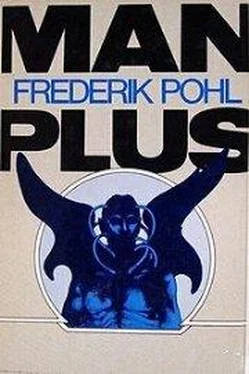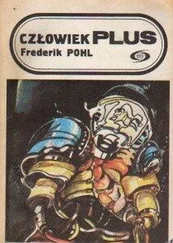Eight
Through Deceitful Eyes
The weather had changed quickly and for good. We had seen the shift coming as a wedge of polar air pushed down out of Alberta as far as the Texas Panhandle. Wind warnings had grounded the hovercars. Those of the project personnel who didn’t have wheeled vehicles were forced to come by public transportation, and the parking lots were almost bare except for great ungainly knots of tumbleweed bouncing before the wind.
Not everyone had heeded the warnings, and there were the colds and flu bugs of the year’s first real cold snap. Brad was laid up. Weidner was ambulatory, but not allowed near Roger for fear of infecting him with a trivial little illness that he was in no shape to handle. Most of the work of doing Roger was left to Jonathan Freeling, whose health was then guarded almost as jealously as Roger’s own. Kathleen Doughty, indestructibly tough old lady, was in Roger’s room every hour, dropping cigarette ash and advice on the nurses. “Treat him like a person ,” she ordered. “And put some clothes on before you go home. You can show off your beautiful little butt any time — what you have to do now is keep from catching cold until we can spare you.” The nurses did not resist her. They did their best, even Clara Bly, recalled from her honeymoon to fill in for the nurses on the sick list. They cared as much as Kathleen Doughty did, although it was hard to remember, looking down at the grotesque creature that was still named Roger Torraway, that he was in fact a human being, as capable of yearning and depression as themselves.
Roger was beginning to be more clearly conscious from time to time. Twenty hours and more each day he was out cold, or in a half-dreaming analgesic daze; but sometimes he recognized the people in the room with him, and sometimes even spoke coherently to them. Then we would put him out again.
“I wish I knew what he was feeling,” said Clara Bly to her relief nurse.
The other girl looked down at the mask that was all there was left of his face, with the great wide eyes that had been fabricated for him. “Maybe you’re better off if you don’t,” she said. “Go home, Clara.”
Roger heard that; the oscilloscope traces showed that he had. By studying the telemetry we could form some notion of what was inside his mind. Often he was in pain, that was evident. But the pain was not a warning of something that needed attention, or a spur to action. It was simply a fact of his life. He learned to expect it and to accept it when it happened. He was not conscious of very much else that pertained to his own body. His body-knowledge senses had not yet come to deal with the reality of his new body. He did not know when his eyes, lungs, heart, ears, nose and skin were replaced or supplemented. He didn’t know how to recognize the clues that might have given him information. The taste of blood and vomit at the back of his throat: how was he to know that that meant his lungs were gone? The blackness, the suppressed pain in the skull that was so unlike any other headache he had ever had: how could he tell what it meant, how could he distinguish between the removal of his entire optic system and the turning off of a light switch?
He realized dimly at one point that somewhen he had stopped smelling the familiar hospital aroma, scented odor killer and disinfectant. When? He didn’t know. All he knew was that there were no smells in his environment any more.
He could hear. With a sharpness of discrimination and a level of perception he had never experienced before, he could hear every word that was said in the room, in however low a whisper, and most of what happened in the adjoining rooms as well. He heard what people said, when he was conscious enough to hear at all. He understood the words. He could feel the good will of Kathleen Doughty and Jon Freeling, and understood the worry and anger that underlay the voices of the deputy director and the general.
And above all, he could feel pain.
There were so many different kinds of pain! There were all the aches of all the parts of his body. There was the healing of surgery, and there was the angry pulsing of tissues that had been bruised as major work was done. There were the endless little twinges as Freeling or the nurses jacked instrumentation into a thousand hurtful places on the surface of his body so that they could study the readings they gave.
And there was the deeper, internal pain that sometimes seemed physical, that came when he thought of Dorrie. Sometimes, when he was awake, he remembered to ask if she had been there or had called. He could not remember ever getting an answer.
And then one day he felt a searing new pain inside his head… and realized it was light.
He was seeing again.
When the nurses realized that he could see them they reported to Jon Freeling at once, who picked up the phone and called Brad. “Be right over,” Brad said. “Keep him in the dark till I get there.”
It took more than an hour for Brad to make the trip, and when he turned up he was clearly wobbly. He submitted to an antiseptic shower, an oral spray and the fitting of a surgical mask, and then, cautiously, he opened the door and entered Roger’s room.
The voice from the bed said, “Who’s there?” It was weak and quavering, but it was Roger’s voice.
“Me. Brad.” He fumbled along the side of the door until he found the light knob. “I’m going to turn the lights on a little bit, Roger. Tell me when you can see me.”
“I can see you now,” sighed the voice. “At least I guess it’s you.”
Brad arrested his hand. “The hell you canhe began, and then he paused. “What do you mean, you see me? What do you see?”
“Well,” whispered the voice, “I’m not sure about the face. That’s just a sort of glow. But I can see your hands, and your head. They’re bright. And I can make out your body and arms pretty well. A lot fainter, though — yeah, I can see your legs, too. But your face is funny. The middle of it is just a splotch.”
Brad touched the surgical mask, comprehending. “Infrared. You’re seeing the heat. What else can you see, Roger?”
Silence from the bed for a moment. Then, “Well, there’s a sort of square of light; I guess it’s the door frame. I mostly just see the outline of it. And something pretty bright over against the wall, where I hear something too — the telemetry monitors? And I can see my own body, or at least I can see the sheet over me, with a sort of outline of my body on it.”
Brad stared around the room. Even with time for dark adaptation he could see almost nothing: a polka-dot pattern of illuminated dials from the monitors, and a very faint seepage of light around the door behind him.
“That’s pretty good, Rog. Anything else?”
“Yeah, but I don’t know what they are. Some lights low down, over near you. Very dim.”
“I think those are the heating ducts. You’re doing fine, boy. All right, now hold on. I’m going to turn up the room lights a little bit. Maybe you can get along without them, but I can’t and neither can the nurses. Tell me what you feel.”
Slowly he inched the dimmer dial around, an eighth of a turn, a bit more. The surround lights behind the moldings under the ceiling came alive — weakly at first, then a trifle stronger. Brad could see the shape on the bed now, first the glitter of the spread wings that had revolved forward, over the body of Roger Torraway, then the body itself, with a sheet draped over it waist-high.
“I see you now,” sighed Roger in his reedy voice. “It’s a little different — I’m seeing color now, and you’re not so bright.”
Brad took his hand off the knob. “That’s good enough for now.” He leaned back against the wall giddily. “Sorry,” he said. “I’ve got a cold or something… How about you, do you feel anything? I mean, any pain, anything like that?”
Читать дальше












